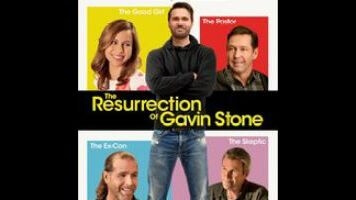Produced in a bizarre alliance between sometime blockbuster-funders Walden Media, Blumhouse offshoot BH Tilt, the WWE, and an ominous-sounding church outfit, the movie introduces Gavin through a clumsy recreation of an Entertainment Tonight-style “Where Are They Now?” segment that answers its own question with an indifferent shrug. It’s really just there to explain Gavin’s background as the formerly cute star of the sitcom Family Life, spouting the blame-deflecting catchphrase “Don’t look at me!” The filmmakers can’t be bothered to rip off a real sitcom catchphrase, instead performing blatant theft of Bart Simpson’s “I didn’t do it!” Even this movie’s parody of hackiness is hacky.
After an offscreen party where he helped trash a hotel roof bar (clearly the most decadent indulgence the filmmakers can conceive), Gavin is sentenced to 200 hours of community service, which he must perform in his Illinois hometown. (He must also receive an obligatory amount of information about himself for the sake of exposition: “I’m your manager!” “He’s your dad!” “You trashed a hotel roof bar!”) He semi-inexplicably moves back in with his disapproving father (Neil Flynn) and starts helping out at a church so mega that no one goes up for communion—it’s passed around as congregants stay in their seats.
In what seems like an attempt to keep the tone lightly comic, Gavin begins the movie newly sobered up, which means the movie has shunted both a major dramatic struggle and a possible source of laughs far off screen. Instead, the story focuses on his mild struggle to pose as a Christian in order to use his volunteer hours acting in a church play about Jesus, because that’s better than cleaning restrooms. Through its piousness, the screenplay imagines posing as a Christian as a significant act of deception, as if Christianity wasn’t an extremely common religious choice—because while no one ever says it, who Gavin really needs to pass as is a born-again Christian, which the movie quietly conflates with all Christianity, just as it conflates megachurch services with all Christian worship.
The movie tries to make comic hay out of Gavin not knowing how to sing along with a song he doesn’t know (even though there are sing-along subtitles on the megachurch’s megascreens), or not knowing how to pass along a donation receptacle, his Hollywood corruption having denied him any opportunities to pass an object from one person to another. Gavin taking a handful of communion wafers and eating them like chips, though, is kind of funny. That’s about as far as the laughs go; most of the humor is of the good-natured, morally upright variety, which is to say it’s aimed at everyone from the converted to the about-to-be-converted—anyone who would be grateful for the merest appearance of levity and wouldn’t be so selfish as to demand real laughter. For his part, director Dallas Jenkins ends some scenes with overlapping dialogue, clearly hoping that it’ll sound like naturalism or improv or jokes. The canned jocularity produces none of the above.
Gavin jumps into the role of Jesus in part because he decides he wants to woo Kelly (Anjelah Johnson-Reyes), the pageant’s director and also the daughter of the megachurch’s pastor (D.B. Sweeney). She’s busy, serious, and faithful, while he doesn’t read the Bible. Their supposed odd-couple chemistry consists of conversations shot with the same stultifying alternating one-shot rhythm that seems to prompt each actor to speak at every cut, highlighting the faux-casual awkwardness of lines like, “Not to get cheesy or anything, but we’re doing this for the Lord, you know?”
Eventually, as in so many chintzy tributes to small-town humility before it, Gavin must choose between the siren song of his old, debauched Hollywood life and his new, more rewarding station where he lives with his father, works long hours for no pay, socializes exclusively with other born-agains, and will presumably perform Herculean efforts to get to first base with the woman he likes. This being a Christian-lesson film, the deck is stacked for the latter, and it becomes imperative that the audience sits through large swaths of Gavin’s performance as Jesus, plus shots of other characters solemnly weeping.
It’s become a film-snob and nonbeliever cliché to sneer at Christian-produced entertainment and instead claim sanctuary with selected works of Martin Scorsese as “correct” movies about religion and faith. But it’s hard not to favor that tortured intensity when lighter, less complicated fare like The Resurrection Of Gavin Stone depicts faith in the language of bargain-basement rom-coms and TV movies. For that matter, Silence is funnier, too.

